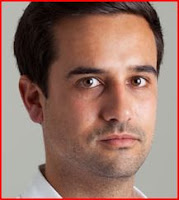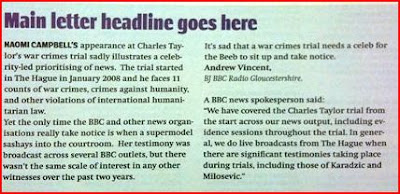
The latest episode of Tobias Grubbe, the creation of Michael Cross and Matthew Buck, is here.
A freelance journalist writing from the UK.








 The News of the World's scoop on the Pakistan cricket team betting scandal is the lead in The Times and Guardian today as well as being followed up by all the major broadcasters.
The News of the World's scoop on the Pakistan cricket team betting scandal is the lead in The Times and Guardian today as well as being followed up by all the major broadcasters.


 An England footballer has won a continuation of a High Court gagging order preventing the "misuse" of private information about him, the BBC reported today.
An England footballer has won a continuation of a High Court gagging order preventing the "misuse" of private information about him, the BBC reported today.
Lord Lester who is proposing a Defamation Bill which would reform Britain's libel laws tells the Independent today that the way they are presently framed "is the enemy of free speech."



 A British journalist has won a High Court libel action in Austria over claims he made up interviews for a book.
A British journalist has won a High Court libel action in Austria over claims he made up interviews for a book.




 The NUJ says the Police Service of Northern Ireland has returned the mobile phone seized on Thursday 19th August from Derry freelance journalist Eamonn MacDermott and have advised him that they have accessed his phone records.
The NUJ says the Police Service of Northern Ireland has returned the mobile phone seized on Thursday 19th August from Derry freelance journalist Eamonn MacDermott and have advised him that they have accessed his phone records.




 Former journalism.co.uk journalist Judith Townend (left) is conducting a short survey of UK-based online publishers, bloggers and writers looking at the legal climate in which they operate.
Former journalism.co.uk journalist Judith Townend (left) is conducting a short survey of UK-based online publishers, bloggers and writers looking at the legal climate in which they operate.
 The NUJ has expressed alarm at the actions of the Police Service of Northern Ireland in confiscating a mobile phone belonging to Derry-based freelance journalist Eamonn MacDermott.
The NUJ has expressed alarm at the actions of the Police Service of Northern Ireland in confiscating a mobile phone belonging to Derry-based freelance journalist Eamonn MacDermott.

 WikiLeaks has launched ThaiLeaks to get round the ban imposed on the whistleblowing website by the Thai government.
WikiLeaks has launched ThaiLeaks to get round the ban imposed on the whistleblowing website by the Thai government.

 St Bride’s Church in Fleet Street will be holding a service in November to commemorate all the UK journalists, cameramen and support staff who have died while reporting from the war zones and conflicts of the 21st Century.
St Bride’s Church in Fleet Street will be holding a service in November to commemorate all the UK journalists, cameramen and support staff who have died while reporting from the war zones and conflicts of the 21st Century. Thai authorities have used emergency powers to block the WikiLeaks website on security grounds, claiming it could lead to further unrest, the Telegraph reports today.
Thai authorities have used emergency powers to block the WikiLeaks website on security grounds, claiming it could lead to further unrest, the Telegraph reports today.




